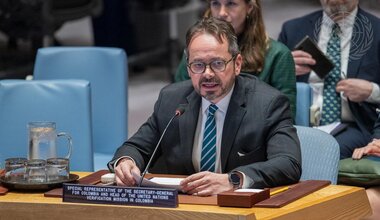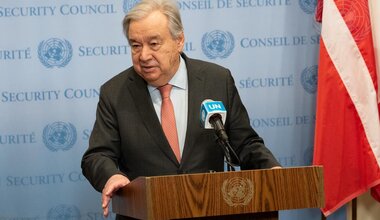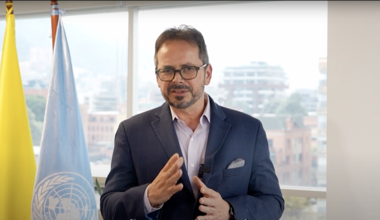Statement by Carlos Ruiz Massieu, Special Representative of the Secretary-General United Nations Security Council meeting on Colombia
Statement by Carlos Ruiz Massieu, Special Representative of
the Secretary-General for Colombia
Security Council meeting, 21 April 2021
Mr. President:
Thank you for the opportunity to present to you and the Council the latest report of the Secretary-General on Colombia, and brief the Council on important developments since the issuance of the report.
It is an honor to share this session with Foreign Minister Claudia Blum, and I take the opportunity to thank her once again as well as her team for the usual support extended to the Verification Mission.
Mr. President, Distinguished Members of the Council:
Victims are at the center of the Final Peace Agreement signed between the Government of Colombia and the former FARC-EP. Their participation during the negotiation phase was crucial to ensure that their perspectives were taken into account, and today they are a fundamental pillar of peacebuilding and the pursuit of reconciliation. Their courage and generosity should be a source of inspiration for the signatory parties to continue working to fulfill the commitments enshrined in the Agreement and for all actors in Colombian society to support them in this task.
On 9 April, Colombia commemorated the National Day of Memory and Solidarity with Victims. On this occasion, I had the opportunity to talk to representatives of victims of crimes committed by both the former FARC-EP and State agents. Certainly, these conversations are an important reminder that, regardless of the source of the pain, guaranteeing truth, justice, reparation and non-repetition is the best way to repair the damage and to prevent more victims in Colombia.
To do so, it is necessary to guarantee the inclusion, effective participation and security of all victims. Likewise, it is essential that all actors involved in the conflict give concrete signs of their commitment so that the expectations of the victims can be met and to consolidate the foundations for closing the wounds left by conflict.
Mr. President, Members of the Council:
The meeting held between President Iván Duque and the leader of the Comunes party, Rodrigo Londoño, is undoubtedly a very encouraging development. Its constructive spirit provides a solid basis for the parties to continue working together despite their different visions. Having different political positions should not, in any way, translate into affecting the superior interest, which is the implementation of the Peace Agreement. I encourage the parties to continue to move forward in defining the roadmap for implementation agreed at that meeting.
Now into the fifth year of implementation, it is also essential that the parties remain committed to building on the achievements made and resolving pending challenges, and thereby move forward –with the support of all actors in Colombian society– in solving structural problems, particularly considering the challenges of overcoming the COVID-19 pandemic.
Mr. President:
Protecting life is the fundamental purpose of any peace process. In the case of Colombia, the importance of carrying out appropriate actions to achieve this is even more evident in light of the violence facing communities, social leaders, and former FARC-EP members. Since the publication of the Report of the Secretary-General, acts of violence against social leaders and communities have been registered in different departments, one of them the department of Cauca, where yesterday the indigenous governor Sandra Peña was killed, and also four more former combatants have been killed, for a total of 266 since the signing of the Agreement.
On April 9, authorities reported the arrest of the alleged perpetrator of the killings of a social leader and two former combatants. This is a positive result that highlights the importance of redoubling the efforts by state entities involved in the fight against impunity and of ensuring them appropriate financial and technical resources. It is urgent that the policies and measures taken by the State – including the recent Strategic Security Plan– translate into better results, especially in the 25 municipalities that concentrate most of this violence. I hope that by the end of 2021 we will be able to report that the trend of these deplorable crimes has finally been reversed.
Similarly, the sustained presence of the security forces, accompanied by the growing deployment of public entities and services, is essential to guarantee the effective control of the territory and to improve the protection of communities by the State, as well as to allow for the consolidation of development opportunities and the rule of law.
Mr. President, Distinguished Members of the Council:
The Agreement establishes that a stable and lasting peace requires the effective reintegration of former FARC-EP members into social, economic, and political life. Progress made by the parties in this regard has been notable. In this period, progress by the Government in the purchase of land for former Territorial Areas for Training and Reintegration (TATR), including two additional since the issuance of the report, is encouraging. Thanks to the Government’s commitment and to the concerted work with former combatants, seven of the 24 former TATRs now have land.
An example of the opportunities for reconciliation generated by the Peace Agreement was the recent donation by Álvaro Zora –a businessman that in the past suffered the kidnapping of his father by an illegal armed group– of land in Quibdó, Chocó, for nearly 50 former combatants to carry out their fish-farming projects and build their homes. This act of generosity provides certainty and rootedness to dozens of families of former combatants committed to building a better country, a new country, especially in this department that has been so hard-hit by the conflict and poverty.
Two additional collective projects were recently approved in the National Reintegration Council (NRC), for a total of 90. Here it is noteworthy that we are close to 50% of former combatants participating in collective and individual projects. Similarly, the parties have agreed to create a technical working group on housing within the framework of this Council, which I hope will lead to solutions to advance access to housing for former combatants and their families.
These developments show the potential of joint work between the State, former combatants, victims, and communities to transform the territories affected by conflict. The Government’s efforts to respond to the needs of communities in conflict-affected areas, and the communities’ interest in participating in the implementation of initiatives such as the Development Programs with a Territorial Focus, should be highlighted, although they still need to be complemented with other fundamental aspects of the Agreement, such as the coordinated implementation of the National Sectoral Plans of the Comprehensive Rural Reform. Similarly, it is necessary to take firm steps to bring sustainable productive opportunities to more families in the National Comprehensive Programme for Substitution of Illicit Crops, a programme that has shown its potential to change conditions in areas with presence of illicit crops and to strengthen the communities’ trust in the State.
As progress is made in this direction, it is necessary for the parties to accelerate the implementation of the gender provisions of the Agreement and for all actors to boost the role of women’s organizations in peacebuilding. Women’s participation is imperative for peace to be truly inclusive and sustainable.
Mr. President:
It has been more than a year since the COVID-19 pandemic hit Colombia. My heart goes out to all those who have lost loved ones to the disease. The Government, local authorities and the public have made significant efforts to overcome the pandemic and restore normalcy, and while the road to recovery is still long and challenging, I am convinced that the comprehensive implementation of the Peace Agreement will help the country to move gradually in that direction.
The Mission has also progressively returned to its normal functioning, including field activities where our presence is most needed. I have visited several regions, among them Valle del Cauca department, where I met political and religious authorities, former combatants and leaders of the communities who recounted the difficulties and challenges facing thousands of civilians –especially of Afro-Colombian origin– due to the clashes between armed groups, the presence of illicit economies and limited socioeconomic opportunities.
In this complex context, and to help advance the pandemic recovery efforts, allow me to renew the calls of the Secretary-General and those of this Council for an immediate cessation of hostilities. We have seen the positive impact that these gestures can have in the lives of vulnerable communities in conflict-affected regions.
Mr. President, Members of the Council,
The progress by the three components of the transitional justice system created by the Agreement is certainly encouraging. The Special Jurisdiction for Peace (SJP) continues to make key decisions to deliver justice for crimes committed during the conflict; the Truth Commission is holding important acts of reconciliation while preparing its report; and the Unit for the Search of Persons Deemed as Missing is moving forward with its noble task.
In concluding, Mr. President and distinguished Members of the Council, I really would like to express once again my gratitude to the Council for its constant and decisive support to the Colombian peace process.
I thank you, Mr. President.
***
Download the Report of the Secretary-General on the UN Verification Mission in Colombia. S/2021/298
 UN
UN





